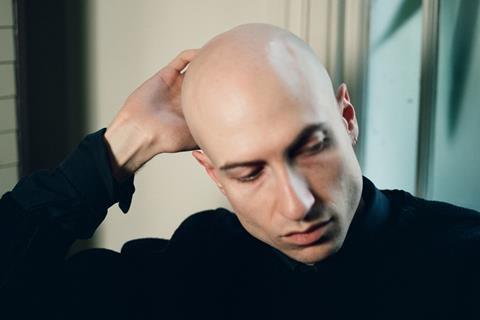
Daniel Blumberg is a British visual artist, musician and composer. He won the Bafta and Oscar for his score for The Brutalist, for which he is also nominated for film composer of the year at the World Soundtrack Awards. Since The Brutalist, he has completed work on Mona Fastvold’s musical The Testament Of Ann Lee, starring Amanda Seyfried as the founding leader of the Shakers religious sect, and Gianfranco Rosi’s documentary Below The Clouds, both of which premiered at this year’s Venice Film Festival.
Since you last spoke to Screen in January, you’ve won both the Bafta and Oscar. Did those awards change your life in any way? Has Hollywood been on the phone asking you to score their big movies?
Yes, but the day after the Oscars, I came back to London and started working on Mona’s new film. Well, not started, I started with the edit straight afterwards. And that was a musical. I’ve been working on that every day until last month. I also did the Gianfranco Rosi film. I only stopped working a week and a half ago, for the first time since I started The Brutalist. So nothing has changed at all in that respect. Obviously, people look at those awards as an indication of [worth]… But Gianfranco asked me to do his film and he’s one of my favourite filmmakers. He works as a one-man team, really, so that was a beautiful process making that.
How did you approach The Brutalist score? You are good friends with co-writer/director Brady Corbet and he showed you the script early on – did you immediately hear the music in your head, or do you go through a process of finding it?
When I read the script, I immediately thought of John Tilbury, the pianist. Brady and I were talking about the work while he was writing it, and I was digesting certain things he was saying. Sometimes the script almost feels like notes to me and conversations we’ve had. The idea of [using] prepared piano came very suddenly reading the script, but that was quite obvious because it’s made with screws and materials that would be associated with construction. So, it was sonically solid. Brady and I have spoken about music over the years and so it was a continuation of all our conversations; it was quite easy to get started.
At what point did the idea of using brass come into it?
It came later. I remember in pre-production, I went to stay with [Brady] and there was a lot of stuff in the script that pointed towards that instrument, because it can be quite harsh-sounding but can also evoke melancholy. And particularly with the opening scene, the credits and the overture with the bus, there was this hopeful sound when [Adrien Brody’s character] is going to Philadelphia, so it felt like a nice idea to use brass for that. It was something I felt could carry us through the broadness of the work. It’s quite adaptable and is also big-sounding.
You lived with Brady during pre-production and filming. Why do you mesh so well together?
We’ve been close since we first met. Literally the night we met, we slept in my flat and we couldn’t stop talking. And then for years I’ve stayed on Brady and Mona’s sofa in New York. Now they have a spare room. But, in general, I like to be in the same room with the people I’m working with, because I can feel someone’s response very quickly rather than having to dilute it with time and phone calls and stuff like that. It made sense to be together.
With Mona’s last film [The World To Come], I went to the set for a week and that was very informative. You get a lot of clues even from the production design. It’s the same as when I do a concert. I don’t really know what I’m going to do until I’ve gone into this space and felt the dimensions of what’s happening, what could happen. But also, it’s the nature of how [The Brutalist] was put together. It was a short shoot, and Brady wanted to shoot to music, so the proximity was helpful. With Mona’s new film, I was doing a lot of recording in my Airbnb in Budapest. I don’t know if it’s going to be like that forever, but it relates to how I work with musicians. I work a lot in my flat in London so we don’t have to pay for a studio and can have time to talk and digest ideas.
Going back to my initial question, if Hollywood called and asked you to work on a big, mainstream movie, would you be interested?
It depends what the circumstances are, and if I felt it’s a productive thing to do. With Gianfranco, I knew the process would be special. I’ve known him for years but being able to experience the way he works and spend time with someone I respect and work with some musicians I love as well, for me that’s sort of the peak. My aspirations in terms of work are just the same as they’ve been for many years, which is, it’s my life. Doing this film with Mona was over a year of my life and it was an interesting experience and very experimental.
You learn lots when you’re working with people who inspire you, and I find the technical aspects of some of these situations very interesting. With Gianfranco’s film, I recorded everything underwater. I was using microphones called hydrophones that record underwater. And geophones, which are used to measure volcanic activity and earthquakes. I like stuff where you have an idea, you have no idea what it’s going to sound like, then you have this really nice space to experiment.

























No comments yet